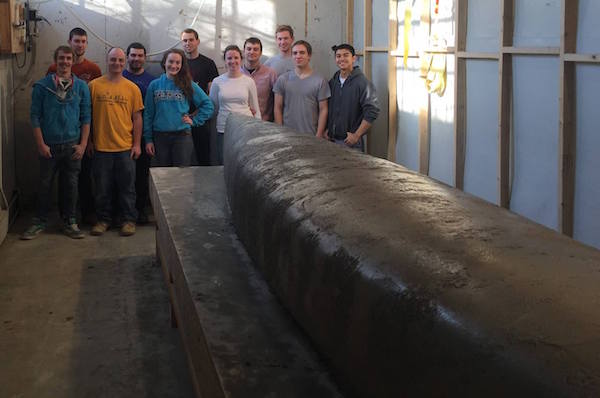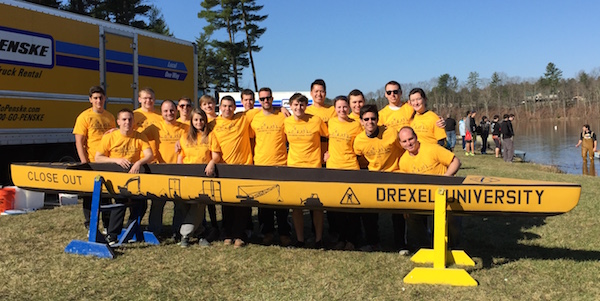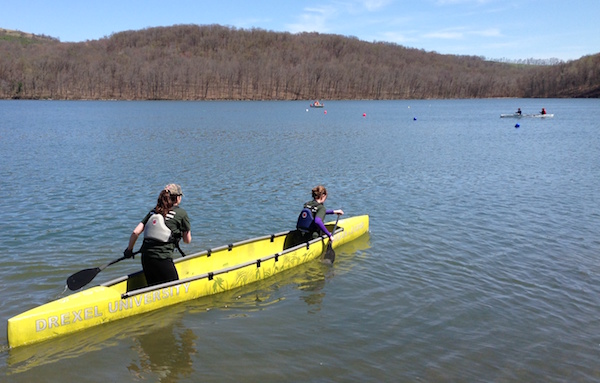While preparing a concrete mix for Drexel’s concrete canoe, a member of the Drexel Concrete Canoe Team was discussing his choice for an aggregate to mix into the concrete with Colleen Hyde, a BS student in the Department of Materials Science and Engineering and a leading member of the Drexel Concrete Canoe Team. The student was restocking the supply of an aggregate, but selected a smaller particle size than what the team normally used and was not concerned about the switch.
“A change in the particle size would effect the properties of the mix,” says Hyde. “As a materials engineer, this is something I know a lot about.”

The Drexel Concrete Canoe Team after construction of the 2016 canoe. (Hyde is in white.)
The Concrete Canoe competition is an activity run by the American Society of Civil Engineers (ASCE). Used frequently as a building material for many different structures, concrete is the bastion of civil engineering. Most students on the team are civil engineers and, when she joined the team, Hyde was an anomaly coming from a materials background.
“I was the first person from the Department of Materials Science and Engineering to join the team,” she says.
Looking for a club to enhance her materials science and engineering education outside of the classroom, Hyde attended a Concrete Canoe meeting at the urging of a friend and never looked back. As a leader within the club, Hyde has been part of the team’s progress over the last five years, including placing first in the regional competition and 10th in nationals in 2014.
Having a background in materials science and engineering has been an asset to the concrete canoe team.
“Even though concrete is the main material the competition is known for, we use a number of different materials to construct the canoe,” says Hyde.

The Drexel Concrete Canoe Team at the 2015 competition. (Hyde is third from right in the front row.)
The Drexel team is student run, allowing for ample leadership opportunities. The group has their own lab and meets twice a week to work on their year-long project. The team gathers in the fall to go over the national guidelines issued by ASCE for that year’s competition. While the ultimate goal is to build a viable canoe that will float and can compete in a canoe race, there are many components to the whole project, including project management, research, design, building, and testing. From year to year, the rules fluctuate slightly, but the winning canoe consistently has to have the highest strength and be significantly lightweight to win. The competition is held in the spring and includes a technical paper about the project, an oral presentation by the team members, an aesthetic component, and the canoe race itself. A typical canoe is 20 feet long and weighs close to 300 pounds. The team is in charge of creating a hull design that will help the canoe float and travel quickly. Flotation tanks are incorporated at the bow and stern to further assist with buoyancy.
Drexel is a member of the ASCE Mid-Atlantic Region, one of 18 regional associations that compete. The 18 first place teams from each region then go on to compete in the national competition, held in a different city annually.
The hands-on teamwork approach appeals to Hyde. She has enjoyed meeting people from other class years through the club and being a part of the many different aspects of the project, as well as having the opportunity to attend a conference and present on the hard work that’s been done throughout the year.

Drexel Materials BS student Colleen Hyde (in front) racing the 2013 canoe.
Throughout her five years, Hyde has held a variety of roles within the organization. As an active member, ASCE only permits students to compete at the competition for three years, either as a paddler or presenter. She has served as a paddler of the canoe, presenter, and co-project manager.
“My involvement in concrete canoe has led to my more active involvement in ASCE as a whole,” says Hyde, who has served as Treasurer of ASCE and has done other volunteer work for the organization. This year, Hyde is the lead planner for the 2016 Mid-Atlantic Region ASCE Student Conference, to be held at Drexel April 22nd to 24th.
The 2016 regional conference will focus on not only the concrete canoe competition, but will also include Steel Bridge, GeoWall, and technical paper competitions. Approximately 300 students from 14 different schools will attend the conference.
In addition to her involvement in Concrete Canoe and ASCE, Hyde participates in DEMO, Drexel Experiences in Materials Outreach, helping to introduce the general public and prospective students to materials science and engineering through hands-on demos at events throughout the year, both at Drexel and other venues.
Hyde is positive about her experiences with Concrete Canoe and encourages other materials students to look into being a part of the team. She is now joined by another Drexel Materials student, Dylan Eckels, who is this year’s Mix Manager for the project.
“It has been a great experience for me to take something on for myself and be a part of a team and see a project through from start to finish,” says Hyde. “I thought it was a good accomplishment to have. It has been great to talk about in co-op and job interviews too.”
Now in her senior year, Hyde is looking into job opportunities in research and testing. Through Concrete Canoe, she has found an interest in being part of a project and getting to see it through to completion. Hyde would like to see the affects of a project on the industry side as it applies to an overall product or technology.